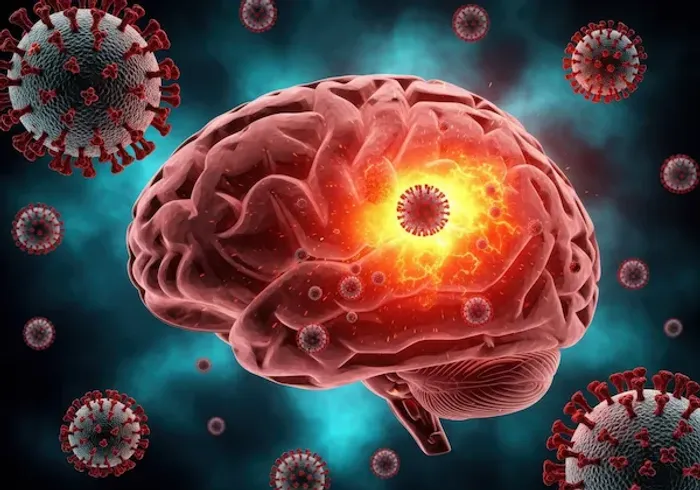What Leads To Signs Of Brain Infection
Understand the causes and signs of brain infection, including symptoms, risk factors, and treatment options. Learn the importance of early diagnosis for better outcomes.

Written by Dr. J T Hema Pratima
Reviewed by Dr. Dhankecha Mayank Dineshbhai MBBS
Last updated on 13th Jan, 2026

A brain infection is a medical emergency that strikes at the very core of who we are—our thoughts, movements, and senses. When pathogens like viruses or bacteria invade the brain or its surrounding tissues, they trigger inflammation that can lead to devastating consequences if not treated immediately. Understanding what leads to these signs of a brain infection is the first critical step toward protecting yourself and your loved ones. This guide will demystify the causes, from common viruses to rare fungi, and outline the unmistakable symptoms you should never ignore. We’ll walk you through how these infections breach the body's defenses, how doctors diagnose them, and the urgent treatments that can save lives. If you suspect a brain infection, timing is everything.
What Exactly is a Brain Infection?
A brain infection is a general term for inflammation caused by microorganisms in the brain, spinal cord, or the protective membranes that surround them, known as the meninges. This inflammation is the body's response to the invader, but in the confined space of the skull, it can cause dangerous swelling and pressure. The specific type of infection depends on its location.
Meningitis: Infection of the Protective Layers
Meningitis is the inflammation of the meninges, the three membranes that cover the brain and spinal cord. It is often caused by viral or bacterial infection. The inflammation leads to the classic triad of symptoms: headache, fever, and a stiff neck, as the swollen membranes irritate the nervous system.
Encephalitis: Inflammation of the Brain Tissue Itself
Encephalitis involves direct inflammation of the brain parenchyma—the functional tissue. This often leads to more pronounced neurological and psychological symptoms, such as confusion, seizures, personality changes, or difficulty with speech and movement. While viruses are the most common cause, autoimmune encephalitis, where the body's own immune system attacks the brain, is also a recognized cause.
Brain Abscess: A Localized Pocket of Infection
A brain abscess is a focal, pus-filled collection within the brain, typically surrounded by a capsule. It’s often caused by bacteria or fungi that have traveled from a nearby infection (like a sinus or ear infection) or through the bloodstream. It acts like a space-occupying lesion, causing symptoms based on its location, such as weakness on one side of the body or vision problems.
Consult a Top Neurologist
The Primary Culprits: What Causes a Brain Infection?
Brain infections are caused by a variety of pathogens, each with its own mode of attack and severity.
Viral Invaders: The Most Common Cause
Viruses are the leading cause of encephalitis and aseptic meningitis.
Herpes Simplex Virus (HSV): HSV-1 is the most common cause of severe viral encephalitis in adults. It can lie dormant in nerves and reactivate to travel to the brain.
Enteroviruses: This large group of viruses is a frequent cause of viral meningitis, especially in children, and is often spread through fecal-oral contamination.
Arboviruses: These are transmitted by insects like mosquitoes and ticks. West Nile Virus is a prominent example that can cause severe neurological disease
Bacterial Intruders: Often More Severe
Bacterial meningitis is less common but typically more life-threatening than viral forms.
Streptococcus pneumoniae: The leading cause of bacterial meningitis in adults, often associated with pneumonia or ear/sinus infections.
Neisseria meningitidis: Causes meningococcal meningitis, known for its rapid onset and associated rash. It can cause outbreaks in close-contact settings like college dorms.
Listeria monocytogenes: A particular concern for pregnant women, newborns, the elderly, and those with weakened immune systems, as it can be found in contaminated food.
Fungal and Parasitic Infections: Less Common but Serious
Fungal infections (e.g., Cryptococcus, Histoplasma) typically affect immunocompromised individuals. Parasites like Toxoplasma gondii can also cause severe brain infections in people with AIDS or organ transplants.
How Do These Infections Reach the Brain?
The brain is protected by the blood-brain barrier, a sophisticated filtering system. However, pathogens can bypass it in several ways.
The Bloodstream Highway (Hematogenous Spread)
This is the most common route. An infection starts elsewhere in the body (e.g., lungs, heart valves, urinary tract). The pathogen enters the bloodstream, circulates, and manages to cross the blood-brain barrier.
Direct Contact from a Nearby Infection
An untreated infection in a nearby structure can erode through bone and tissue to reach the brain. Examples include:
Severe sinusitis or otitis media (middle ear infection)
A dental abscess
A skull fracture from trauma that provides a direct pathway
Through Damaged Nerves
Some viruses, notably Rabies and Herpes Simplex, have a unique ability to enter nerve endings at the site of infection and travel along the nerve pathways directly into the central nervous system, completely bypassing the bloodstream.
Recognizing the Red Flags: Symptoms of a Brain Infection
Symptoms can develop suddenly or over several days and vary based on the type and severity of the infection.
Common Early Warning Signs
Sudden high fever
Severe, persistent headache that feels different from normal
Stiff neck, making it difficult to lower your chin to your chest
Nausea and vomiting
Photophobia (sensitivity to light)
Confusion or difficulty concentrating
Symptoms in Infants and Young Children
Bulging in the soft spot on the head (fontanelle)
Constant crying, which may be high-pitched
Excessive sleepiness or irritability
Poor feeding
Stiffness in the body and neck
Severe Neurological Symptoms
Seizures
Significant personality or behavior changes
Speech difficulties (slurring, inability to find words)
Weakness or loss of movement in limbs
Hallucinations
Loss of consciousness or coma
If you or someone you know is experiencing a severe headache with fever and a stiff neck, seek emergency care immediately. For a preliminary assessment, you can consult a doctor online with Apollo24|7, but note that this is a condition that often requires in-person emergency evaluation.
Conclusion
A brain infection is a formidable health crisis where understanding the causes and recognizing the early signs can make a life-saving difference. From viral and bacterial invaders to the pathways they use to breach the brain's defenses, the mechanisms are complex but knowable. The symptoms, particularly the combination of a severe headache, high fever, and neck stiffness, are clear red flags demanding immediate action. While this information empowers you to identify potential danger, it is no substitute for professional medical care. Diagnosis often requires precise tests like a lumbar puncture or MRI, and treatment hinges on swift administration of the correct medications. If you have any reason to suspect a brain infection, err on the side of caution and seek emergency care without delay. Your vigilance and quick response are the most powerful tools in protecting brain health.
FAQs
Below are a few FAQs,
1. Can a simple sinus infection turn into a brain infection?
A. Yes, though it is rare. An untreated bacterial sinus infection can, in extreme cases, erode through the bony sinus wall and spread to the brain lining or tissue, leading to meningitis or a brain abscess. This underscores the importance of treating sinus infections properly.
2. What is the difference between viral and bacterial meningitis?
A. Viral meningitis is more common and usually less severe, often resolving with supportive care like rest and fluids. Bacterial meningitis is a medical emergency, requiring immediate intravenous antibiotics and hospitalization, as it can be fatal within hours.
3. Are there long-term effects after recovering from a brain infection?
A. Unfortunately, yes. Some survivors may experience long-term neurological sequelae, including memory problems, learning disabilities, hearing loss, seizures, weakness, or coordination issues. Rehabilitation therapy is often necessary.
4. How can I prevent a brain infection?
A. Vaccination is the best defense against certain types of bacterial meningitis (HiB, pneumococcal, meningococcal). Practicing good hygiene, using insect repellent to prevent mosquito bites, and promptly treating any infections in the head/neck region can also reduce risk.
5. How is a brain infection diagnosed in an emergency?
A. The gold standard is a lumbar puncture (spinal tap) to analyze cerebrospinal fluid for signs of infection and inflammation. This is almost always accompanied by blood tests and imaging like a CT scan or MRI to rule out other causes and assess brain swelling.
Consult a Top Neurologist
Consult a Top Neurologist

Dr. Aditendraditya Singh Bhati
Neurosurgeon
21 Years • MBBS(2004), DNB Neurosurgery(2014); MNAMS; Fellow Skull Base Endoscopy (Italy), Fellow Extended Skull Base ( Weill Cornell, USA), Fellow ZAP-X Radiosurgery. Member of American Association of Neurological Surgeons
Delhi
Apollo Hospitals Indraprastha, Delhi
(100+ Patients)

Dr. Ganeshgouda Majigoudra
Neurologist
10 Years • MBBS, MD ( GENERAL MEDICINE) DM (NEUROLOGY)
Bengaluru
Apollo Clinic, JP nagar, Bengaluru

Dr. E Prabhakar Sastry
General Physician/ Internal Medicine Specialist
40 Years • MD(Internal Medicine)
Manikonda Jagir
Apollo Clinic, Manikonda, Manikonda Jagir
(150+ Patients)

Dr S Selvin
Neurologist
10 Years • MBBS, MD, DM (Neurology), FINR fellowhsip in Interventional Neuro Radiology
Chennai
Apollo Speciality Hospitals Vanagaram, Chennai

Dr. Anusha D
Neurologist
16 Years • MBBS, MD, DM (Neuro), DNB (Neuro)
Chennai
Apollo Speciality Hospitals OMR, Chennai
(125+ Patients)


